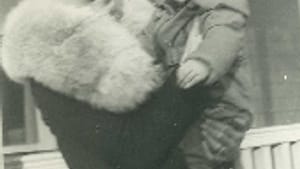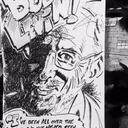Stay in the Loop
BSR publishes on a weekly schedule, with an email newsletter every Wednesday and Thursday morning. There’s no paywall, and subscribing is always free.
Life (after 70) without mother
When a mother vanishes

"Now I am an orphan," the novelist Mark Harris famously began an essay in 1963. He was 40 then. I'm nearly 70 "“ and the same has just come true for me.
My mother died at 99, some 20 years after my father"“ after her sister and brothers and their spouses, and my other aunts and uncles and theirs, and all but a scattering of friends, whose number one hand can count. She survived two world wars and the Great Depression, the coming of radio, TV, computers, the atomic bomb, the Salk vaccine, refrigerators, microwaves, the NBA and the NFL.
During her last years, in her Rittenhouse Square apartment, Mom was bedridden from spinal stenosis. For much of that time, she could barely communicate, due to Parkinson's and strokes. When I telephoned from California to say, "Hi, Mom, how are you?" on a good day I might get, "I'm fine. How are you?" After that, it was a crapshoot.
The last time I phoned, Charlene, one of Mom's caregivers, told me Mom had said "Hello." but too weakly for me to hear. I spoke into the phone for several minutes, not knowing whether she heard or understood me. Then I said, "I love you. Talk to you soon."
For months, the reports hadn't been good. Mom often preferred playing with the phone cord to anything I had to say. She was knitting, despite an absence of needles or yarn. She conducted conversations in Yiddish with a blonde girl in the ceiling. She told one visitor that each morning when she woke, she thought, Damn, I'm still here.
Three weeks ago, Mom told Ruth, another caregiver, that she was speaking with my father and her sister.
"What are they saying?" Ruth asked.
"My sister wants me to come visit," Mom answered. "But I don't want to right now."
Before she died, she took a sip of water, lay down her head, and was gone.
Dolls cut from newspaper
Mom lost her own mother when she was a toddler. Her father sold fruit and vegetables from a horse-drawn wagon. The family was so poor that her only toys were dolls she cut from the newspaper.
My mother graduated from Philadelphia Normal School and became a home economics teacher. She met my father in the late "'30s, at a fund-raiser for the Loyalists in the Spanish Civil War. She had blue eyes, a heart-shaped face, and near waist-length brown hair, pinned and braided into a regal bun. The two friends with whom Dad attended the event asked her for dates— one for the following Friday and one for that Saturday; but my father, the fast worker, was so smitten that he made his date for breakfast the next morning.
"I have met the man I am going to marry," Mom wrote to a friend in Boston. "He is short and bald and smokes smelly cigars." (Presumably Dad had other attractions: He was bright and funny, and she correctly discerned a tenderness beneath his aggressive exterior.) She told Dad she didn't want diamonds or mink. She made him promise never to buy a boat.
They got married in 1939, and I was born in 1942, my sister in 1945, my brother in 1947. My sister died of leukemia in 1950. Adele, my wife and a former psychotherapist, believes my mother never got over the depression that followed her mother's death. I can testify that no one got over my sister's.
"'Consider Catholicism'
I have unconflicted good feelings about my mother. She cooked our meals and bought our clothes and smoothed the rifts that roil any family. She was loving, exceedingly generous, strongly supportive, fiercely protective, strong, funny, bright. The line of hers I quote the most "“ and, regrettably, more and more frequently these days "“ came when Adele and I experienced a cancer scare.
"Hope you're lucky," she counseled. "Hope the doctors know what they're doing. And consider converting to Roman Catholicism."
The departed remain as memories, sensations, visions, feelings, through which we define who we are or remember how we came to be. One image in particular sticks in my mind.
In September 1967, I left Philadelphia for Chicago and a year in VISTA, the deferral volunteer corps. My mother stood at the top of the front steps of our house on 46th Street in West Philadelphia, neither of us suspecting I would never live there again. In my rear view mirror, I saw her wipe tears from her eyes. I choked up but kept driving, staring straight ahead into my future.
The tears are in my eyes now. Much less of my future remains. For nearly 70 years she was in my corner, wishing me and everyone else she knew (with the possible exception of one treacherous brother-in-law) the best of fortune and luck, and reminding us that mink coats don't bring you happiness. And now I'm on my own.♦
To read a response, click here.
My mother died at 99, some 20 years after my father"“ after her sister and brothers and their spouses, and my other aunts and uncles and theirs, and all but a scattering of friends, whose number one hand can count. She survived two world wars and the Great Depression, the coming of radio, TV, computers, the atomic bomb, the Salk vaccine, refrigerators, microwaves, the NBA and the NFL.
During her last years, in her Rittenhouse Square apartment, Mom was bedridden from spinal stenosis. For much of that time, she could barely communicate, due to Parkinson's and strokes. When I telephoned from California to say, "Hi, Mom, how are you?" on a good day I might get, "I'm fine. How are you?" After that, it was a crapshoot.
The last time I phoned, Charlene, one of Mom's caregivers, told me Mom had said "Hello." but too weakly for me to hear. I spoke into the phone for several minutes, not knowing whether she heard or understood me. Then I said, "I love you. Talk to you soon."
For months, the reports hadn't been good. Mom often preferred playing with the phone cord to anything I had to say. She was knitting, despite an absence of needles or yarn. She conducted conversations in Yiddish with a blonde girl in the ceiling. She told one visitor that each morning when she woke, she thought, Damn, I'm still here.
Three weeks ago, Mom told Ruth, another caregiver, that she was speaking with my father and her sister.
"What are they saying?" Ruth asked.
"My sister wants me to come visit," Mom answered. "But I don't want to right now."
Before she died, she took a sip of water, lay down her head, and was gone.
Dolls cut from newspaper
Mom lost her own mother when she was a toddler. Her father sold fruit and vegetables from a horse-drawn wagon. The family was so poor that her only toys were dolls she cut from the newspaper.
My mother graduated from Philadelphia Normal School and became a home economics teacher. She met my father in the late "'30s, at a fund-raiser for the Loyalists in the Spanish Civil War. She had blue eyes, a heart-shaped face, and near waist-length brown hair, pinned and braided into a regal bun. The two friends with whom Dad attended the event asked her for dates— one for the following Friday and one for that Saturday; but my father, the fast worker, was so smitten that he made his date for breakfast the next morning.
"I have met the man I am going to marry," Mom wrote to a friend in Boston. "He is short and bald and smokes smelly cigars." (Presumably Dad had other attractions: He was bright and funny, and she correctly discerned a tenderness beneath his aggressive exterior.) She told Dad she didn't want diamonds or mink. She made him promise never to buy a boat.
They got married in 1939, and I was born in 1942, my sister in 1945, my brother in 1947. My sister died of leukemia in 1950. Adele, my wife and a former psychotherapist, believes my mother never got over the depression that followed her mother's death. I can testify that no one got over my sister's.
"'Consider Catholicism'
I have unconflicted good feelings about my mother. She cooked our meals and bought our clothes and smoothed the rifts that roil any family. She was loving, exceedingly generous, strongly supportive, fiercely protective, strong, funny, bright. The line of hers I quote the most "“ and, regrettably, more and more frequently these days "“ came when Adele and I experienced a cancer scare.
"Hope you're lucky," she counseled. "Hope the doctors know what they're doing. And consider converting to Roman Catholicism."
The departed remain as memories, sensations, visions, feelings, through which we define who we are or remember how we came to be. One image in particular sticks in my mind.
In September 1967, I left Philadelphia for Chicago and a year in VISTA, the deferral volunteer corps. My mother stood at the top of the front steps of our house on 46th Street in West Philadelphia, neither of us suspecting I would never live there again. In my rear view mirror, I saw her wipe tears from her eyes. I choked up but kept driving, staring straight ahead into my future.
The tears are in my eyes now. Much less of my future remains. For nearly 70 years she was in my corner, wishing me and everyone else she knew (with the possible exception of one treacherous brother-in-law) the best of fortune and luck, and reminding us that mink coats don't bring you happiness. And now I'm on my own.♦
To read a response, click here.
Sign up for our newsletter
All of the week's new articles, all in one place. Sign up for the free weekly BSR newsletters, and don't miss a conversation.

 Bob Levin
Bob Levin